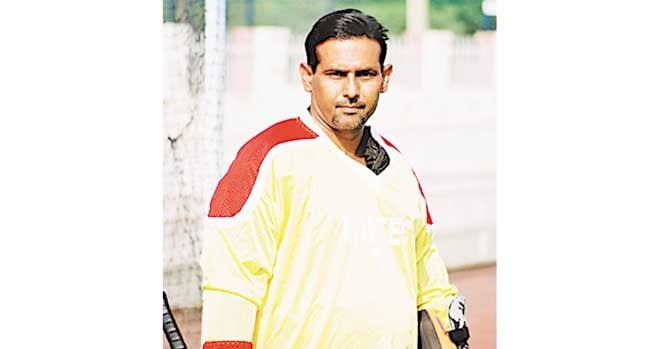

Winters in Islamabad always offer a good opportunity for friends to get together for long gossips around the fireplace. A couple of days ago I invited Mansoor Ahmed, the celebrated hockey captain of Pakistan hockey team and one of the finest goalkeepers.
Mansoor, who joined Pakistan tem in 1986, was declared the best hockey goalkeeper of the world in 1994. He participated in three Olympics, including the 1992 Games in which Pakistan won bronze. He also represented the Green-shirts in five World Cups and three Asian Games. Mansoor rightly describes his era as the "Golden era" of Pakistan hockey in which Pakistan won 1994 World Cup, 1994 Champions Trophy and gold medal at 1990 Asian Games.
What caught my immediate attention was his deep understanding of developing hockey on scientific lines for which he has initiated an academy in Islamabad, where he remains committed to train the future hockey stars of Pakistan.
Mansoor like other ardent sportspersons is also disappointed by the present state of affairs of Pakistan hockey team and the management.
But unlike others, he sees a silver lining at the end of the tunnel and is optimistic about the future of Pakistan hockey. Mansoor hails from a family in which sport and education were considered vital in the development of personality. His grandfather, Anis-ud-Din, was a close associate of the Quaid-e-Azam.
He had his early education from PAF School Chaklala where his skills were honed by Mr Mubarik whom he always remembers as his mentor.
As a gifted, left-handed goalkeeper Mansoor later represented DJ College Karachi, KESC, National Bank of Pakistan and Pakistan Customs.
Mansoor said playing men’s hockey in Pakistan in the seventies and eighties was a full-time job. Departments like Customs, Police, Railways, armed forces, commercial banks and the national airline provided lucrative jobs to hockey players, who had nothing else to do except playing hockey whereas their counterparts in Europe were part-time players.
"It was easy for us to defeat the physically superior European teams on grass. The advent of astro-turf in the eighties led to the birth and development of league hockey in Europe. This was a turning point in the scientific development and coaching of hockey to which our system failed to respond," said Mansoor.
He said hockey players now require more physical fitness, mental alertness, and responsiveness to coaches. "Our players are good at stick work, but they lack fundamental techniques of playing one-touch hockey at a fast pace on astro-turf," he said.
Mansoor said that the modern hockey teams like Holland, Germany and Australia are supported by a staff of about ten specialists, including coaches, physios, notational analysts, nutritionists and a vantage point coach who sits on the rooftop of the stadium with an audio link to assist the chief coach. "The chief coach controls the entire game according to changing circumstances through well-rehearsed contingencies and set of players that he employs from his bench strength.
"In contrast to this scientific hockey played under the ëlaws of diminishing minutes’ our coaching style focuses more on motivation and national pride without any clear objectives to achieve. This leaves our players under prepared and perplexed," he said.
Mansoor also emphasised the importance of strength training in modern hockey. He said that in his playing days with the national team he was the only player who underwent volunteer weight training exercises, but other players never took such training seriously, which resulted in injuries and premature weeding out of the players.
Mansoor said there were five main reasons behind the decline of Pakistan hockey. "These are lack of professionalism as there is no local hockey league, decline of sports in educational institutions, few astro-turfs, joblessness of players and the absence of international competitions in the country," he said.
The corporate sector, according to Mansoor, is equally responsible as it is not fulfilling its responsibility to promote sports.
He said the strained relations between India and Pakistan also hampered hockey development in the sub-continent. "In contrast, Belgium made good use of its neighbours Holland and developed its hockey team on scientific lines," he said.
He said poor defence and substandard half-line players put the forwards under undue pressure, which leads to negative results. Mansoor said Pakistan must focus on developing good local coaches with knowledge of modern hockey and fitness. "Our players face great difficulties while interacting with the foreign coaches who may be good technically but are not aware of our language and culture."
He said it is impossible for the present national hockey team to win any major title. "It would be good for our team and hockey fans if we stopped dreaming of winning world titles. We should set realistic and achievable small goals with the available talent," he said.
He added that the federation should bring in a team of well-meaning professionals to rebuild the structure of Pakistan hockey.
"If we now fail to properly invest in the restructuring and rebuilding of Pakistan hockey, this sport may become a forgotten chapter of our history."
Mansoor said hockey has to be developed on the lines of industry and media should play a part in promoting this game at the grassroots level. "Special efforts have to be made in reintroducing hockey at school level and regional academies have to be established," he said.
"I am willing to do whatever I can, including mobilisation of expatriates to raise funds for development of hockey," he concluded.